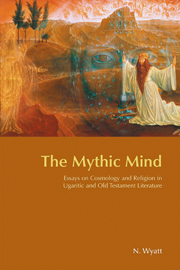Book contents
- Frontmatter
- Contents
- Preface
- Acknowledgments
- Abbreviations
- Chapter 1 THE PROBLEM OF THE ‘GOD OF THE FATHERS’
- Chapter 2 THE DEVELOPMENT OF THE TRADITION IN EXODUS 3
- Chapter 3 THE SIGNIFICANCE OF THE BURNING BUSH
- Chapter 4 WHO KILLED THE DRAGON?
- Chapter 5 SEA AND DESERT: SYMBOLIC GEOGRAPHY IN WEST SEMITIC RELIGIOUS THOUGHT
- Chapter 6 SYMBOLS OF EXILE
- Chapter 7 OF CALVES AND KINGS: THE CANAANITE DIMENSION IN THE RELIGION OF ISRAEL
- Chapter 8 THE DARKNESS OF GENESIS 1.2
- Chapter 9 THE SIGNIFICANCE OF SPN IN WEST SEMITIC THOUGHT: A CONTRIBUTION TO THE HISTORY OF A MYTHOLOGICAL MOTIF
- Chapter 10 THE VOCABULARY AND NEUROLOGY OF ORIENTATION: THE UGARITIC AND HEBREW EVIDENCE
- Chapter 11 THE MYTHIC MIND
- Chapter 12 ‘WATER, WATER EVERYWHERE…’: MUSINGS ON THE AQUEOUS MYTHS OF THE NEAR EAST
- Chapter 13 ANDROGYNY IN THE LEVANTINE WORLD
- Bibliography
- Index of References
- Index of Names and Places
Chapter 8 - THE DARKNESS OF GENESIS 1.2
- Frontmatter
- Contents
- Preface
- Acknowledgments
- Abbreviations
- Chapter 1 THE PROBLEM OF THE ‘GOD OF THE FATHERS’
- Chapter 2 THE DEVELOPMENT OF THE TRADITION IN EXODUS 3
- Chapter 3 THE SIGNIFICANCE OF THE BURNING BUSH
- Chapter 4 WHO KILLED THE DRAGON?
- Chapter 5 SEA AND DESERT: SYMBOLIC GEOGRAPHY IN WEST SEMITIC RELIGIOUS THOUGHT
- Chapter 6 SYMBOLS OF EXILE
- Chapter 7 OF CALVES AND KINGS: THE CANAANITE DIMENSION IN THE RELIGION OF ISRAEL
- Chapter 8 THE DARKNESS OF GENESIS 1.2
- Chapter 9 THE SIGNIFICANCE OF SPN IN WEST SEMITIC THOUGHT: A CONTRIBUTION TO THE HISTORY OF A MYTHOLOGICAL MOTIF
- Chapter 10 THE VOCABULARY AND NEUROLOGY OF ORIENTATION: THE UGARITIC AND HEBREW EVIDENCE
- Chapter 11 THE MYTHIC MIND
- Chapter 12 ‘WATER, WATER EVERYWHERE…’: MUSINGS ON THE AQUEOUS MYTHS OF THE NEAR EAST
- Chapter 13 ANDROGYNY IN THE LEVANTINE WORLD
- Bibliography
- Index of References
- Index of Names and Places
Summary
It is commonly observed that in cosmogonic accounts, darkness precedes light, and is in opposition to it: it represents the chaos which precedes the cosmos. There is a half-truth in this. It is certainly the way in which mythology may express a creation story in its choice of surface language. But to stop at this point, concluding that this is what the myth is about, is perhaps to miss the deeper levels of meaning that are available merely by asking simple questions of the precise vocabulary used, its affective ranges, the order in which words occur in a text (or oral narrative), and even the simple question, are we dealing with prose or poetry?
The account of creation in Genesis 1.1–2.4a begins with perhaps the most discussed verse in the entire Hebrew Bible. The only aspect of it which need detain us is the precise nuance of the term 'eres. Its Ugaritic counterpart, ars, is notoriously difficult to pin down, which is perhaps understandable, given the mythological nature of much of the literature. At times it simply means (1) the ground on which we stand. At others it refers (2) more specifically to what lies underneath the ground, that is, the realm of darkness and death, the abode of the dead. And sometimes it is (3) ambiguous, carrying the overtones of both senses. Context alone guides us in the right direction when trying to interpret it.
- Type
- Chapter
- Information
- The Mythic MindEssays on Cosmology and Religion in Ugaritic and Old Testament Literature, pp. 92 - 101Publisher: Acumen PublishingPrint publication year: 2005



